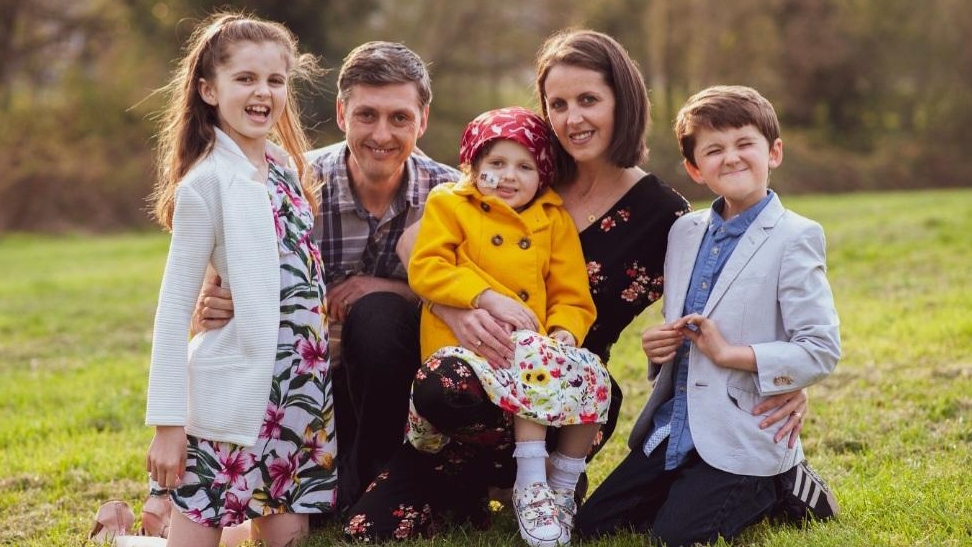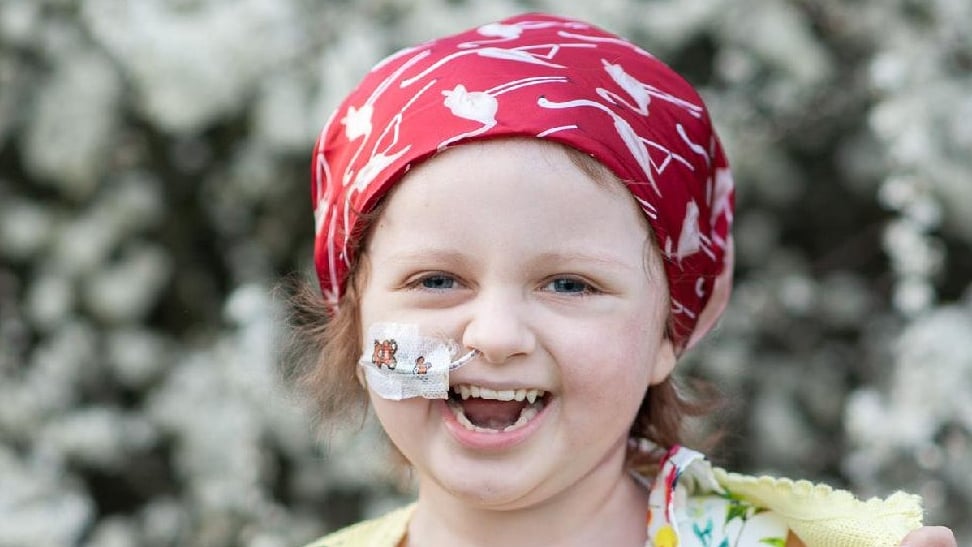
Image: Siobhan. Credit: Simon Roberts
Siobhan was so inquisitive; everything was so exciting to her. She always had a smile on her face and a special bond with her two older siblings, Ciara and Liam. It was wonderful to watch.
Siobhan was also strong-willed and strong-minded. Looking back at it now, we think she needed that strength of character to carry her through her treatment and beyond all expectations of her doctors.
We knew something wasn’t right
On the day of Ciara’s Holy Communion, we noticed something wasn’t right with Siobhan. She wasn’t posing for photos and wasn’t on good form. In the days that followed, she started to become more fatigued, had night sweats and didn’t want to eat. We took her to the doctor, and they thought it might be a urine infection. We had to go back three times before she got a blood test.
After her blood test, we were told she was extremely anaemic and that we should take her to Barnet Hospital. A doctor looked at Siobhan’s results and straight away she had more blood tests. It was a weekend, so we had to wait until Monday morning for an ultrasound. On Monday they confirmed they’d found something significant.
We knew nothing about neuroblastoma
The doctor told us they’d found a large mass just above her adrenal gland, but they couldn’t tell us what it was. We were blue-lighted to Great Ormond Street Hospital.
At this point, Siobhan had become very unwell. She had an MRI scan, and we were told she had neuroblastoma. We didn’t know anything about it, so we started Googling and realised how serious it was.
Treatment started straight away with a chemotherapy regimen called Rapid COJEC, but then Siobhan had an arterial bleed to the tumour. Her heart rate went wild and her blood pressure was really high. She was moved to ICU and put in an induced coma. She was on a BiPAP machine, a type of ventilator which took care of her breathing. We were told to be prepared to tell Siobhan’s siblings that she might not be coming home.

Image: Siobhan with her family. Credit: Simon Roberts
We felt like we had our Siobhan back
The induced coma gave her body time to rest. When they took her out of it, incredibly, she began to bounce back. Treatment restarted and she learned to walk again. Once she’d done the initial chemotherapy, it was like a weight had lifted off her and we felt we had the old Siobhan back.
From there, we were in and out of hospital for treatment, but nothing ever fazed her. Siobhan accepted any medical professional that would walk into the room and allowed them to do what they needed to do. Her determination and the support from our family and friends around us helped her to move forward with her treatment.
After the frontline treatment, we were told her tumour had melted away, so she wouldn’t need surgery to remove it. We remember sitting there thinking that it was amazing and that it was all going to be alright. Siobhan came out of hospital and carried on with the treatment plan. She started immunotherapy and wonderfully, she was in remission.
Find out more about our Family Charity Partners, whose support and dedication drives our work forward.
We were told she had relapsed
One day, we were at home and Siobhan ran over for a cuddle and we felt a lump on her head. She had an ultrasound, and devastatingly, we were told she had relapsed.
At the time, we’d already started fundraising to take Siobhan to New York for a relapse prevention vaccine. The NHS do an incredible job, but there’s only so far you can go with treatments. The support and donations we got from family, friends, the community and even strangers, was incredible. But sadly, the relapse meant she couldn’t go to America.
Siobhan started on targeted therapies, called ALK inhibitors. She was well enough to start nursery, which she was so excited about. It gave us time at home, and we felt like a family again.
After a year, the treatment stopped working. We tried another drug, but it didn’t agree with her. Her face swelled up and her lips and mouth were bleeding, so we all agreed we had to stop it.
She was moved to palliative care as she only had a few weeks left. We looked at another treatment in Barcelona and paid for it, but she became too unwell, and it wasn’t viable.
Siobhan passed away in June 2019 when she was 4 years old.
We want to help other families to avoid going through this
Cancer is horrible, regardless of age, but it’s not right to lose a child. Currently we use the same drugs to treat children that are used in adults. There must be better and kinder treatments for this devastating disease. Without research, we’re not going to find out what those are.
It’s important to us that we do something positive with the money that was generously raised for Siobhan’s treatment. So, if we can help another family to not have to go through this, it’s the least we can do. We’ve set up Siobhan’s Superstar Legacy to do just that.
We’ve teamed up with the Arcobaleno Cancer Trust, a charity which supported Ciara and Liam during Siobhan’s treatment. We’ve transferred the funds raised for Siobhan’s treatment to them and we work together to give grants for research and use the money to help other families of children with cancer.
Hope for the future
We saw that the ICR is researching many different areas of cancer, with real hope for the future so we decided to fund some of the work of Professor Louis Chesler and Dr Sally George to better understand how cancer cells respond to treatments. It’s the first step in the right direction to better understand this type of cancer so that new therapies can be developed.
The scientists are so passionate about their work - they give their lives to it, and they really care. We’ve been to the ICR’s lab to see the research it action and it feels so exciting.
Research is what’s going to save these children. For families like ours in the future, it would be amazing if they were to Google neuroblastoma and see that the outcome will be ok.
We hope that one day, someone will have that breakthrough, and that after all the hard work, researchers will be able to say, ‘we’ve got this’.”
We are world-leaders in the study of cancer in children, teenagers and young adults and have made the huge strides over the past decade in improving treatment options for children with cancer.
This progress is made possible because of long-term investment in this area of research, including from our supporters and family charity partners.
But treatment options for children remain limited. Your regular donations will help us develop the new, kinder innovative treatments that are urgently needed for children with cancer.
